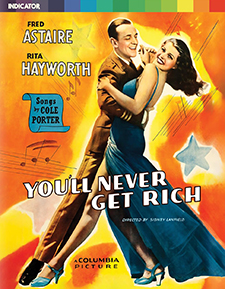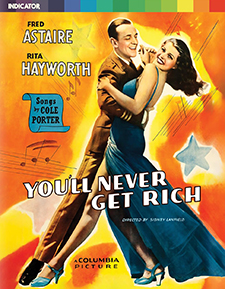You’ll Never Get Rich (Region B) (Blu-ray Review)

Director
Sidney LanfieldRelease Date(s)
1941 (September 23, 2024)Studio(s)
Columbia Pictures (Indicator/Powerhouse Films)- Film/Program Grade: A-
- Video Grade: A
- Audio Grade: A-
- Extras Grade: A
Review
[Editor’s Note: This is a Region B-locked UK import.]
A pleasant surprise, You’ll Never Get Rich (1941) is a very entertaining Fred Astaire-Rita Hayworth musical from Columbia Pictures. I was expecting a lot of superior dancing built around an innocuous, flag-waving wartime propaganda piece, but the screenplay is clever and funny—and quite different from the typical Astaire vehicle. Instead of playing his usual top-hat-white-tie-and-tails screen persona, Astaire is atypically something else, rather hard to describe, but almost a kind of goofball when he’s not dancing. Unless you’ve seen a lot of Astaire musicals you probably wouldn’t notice, but the character he creates here is subtly a notch-and-a-half broader, leaving one to wonder why he didn’t play amusing characters like this more often. Further, the picture is less the standard A-picture musical-comedy and more like a musical-screwball comedy with a lot of funny, inventive material.
The first third of the 88-minute film borders on hilarious, before giving way to more conventional but still funny army comedy business, some of it clearly inspired by the unexpected huge success of Abbott & Costello’s breakthrough hit Buck Privates, released earlier that year. The most obvious evidence of this is a comic drill routine blatantly imitative of the highlight in A&C’s film.
The picture gets off to a funny start with theater owner and incorrigible womanizer Martin Cortland (Robert Benchley, very witty) being driven to work when he asks his chauffeur to slow down—he wants to get a good look at all the road signage—actually the picture’s opening titles. He buys an expensive diamond bracelet for the chorus girl, Sheila (Rita Hayworth), he lusts after while cheaping out on a Chinese back-scratcher as an anniversary gift for his long-suffering wife, Julia (Frieda Inescort). When Julia accidentally finds the bracelet, engraved with Sheila’s name on it, he counters that he bought it for Sheila on behalf of his star dancer and choreographer, Robert Curtis (Astaire), an excuse that doesn’t remotely fool Julia.
Courtland arranges to have Sheila and Robert accidentally “meet” the older couple at a nightclub, so that Robert can extravagantly present the bracelet to Julia. The young dancers are attracted to one another, even though she’s already dating Army Capt. Tom Barton (John Hubbard). Robert ends up enlisting himself, befriending draftees Kewpie Blain (Guinn Williams) and Swivel Tongue (Cliff Nazarro), the latter a master of double-talk. At basic training, Robert continually gets into trouble, spending most of his time in the guardhouse.
The screenplay by Michael Fessier and Ernest Pagano, the latter a veteran of earlier Astaire vehicles at RKO, casts Astaire as something of a schlemiel—suave and elegant on the dance floor but excitable, careless, and accident-prone elsewhere. At basic training, for instance, after taps he has such a nightmare that when his bunk-mates try to wake him he causes their entire tent to collapse on top of everyone. That’s about as far removed from what might expect in an Astaire vehicle as can be imagined. Yet, much of the humor is quite funny and even original. One scene has him haphazardly parking his convertible when a cop threatens to write a ticket because he’s parked in front of a fire hydrant. “That wasn’t there when I parked,” Robert insists. “Oh, I’m sure it wasn’t,” says the cynical cop. “Every time it rains, these fireplugs pop out of the sidewalk like mushrooms.” That would seem to be the mildly amusing end of that bit, but then the camera cuts to a couple of waterworks men lifting the hydrant and moving it into position down the street. A clever gag.
You’ll Never Get Rich has the kind of screwball comedy/musical fantasy conceits audiences then simply accepted at face value, no matter how absurd. The army guardhouse, for instance, includes a spacious dance floor for Astaire to strut his stuff, while a climatic musical revue for the boys features a show-stopper with Fred, Hayworth, and the chorus girls atop a monstrous wedding cake in the shape of an army tank, many times full-size, the kind of thing that could never possibly fit on an ordinary stage.
The film pleasantly soft-sells the government’s enlistment drive and the kind of in-your-face patriotism that followed in Hollywood movies after Pearl Harbor. Likewise, the Cole Porter musical numbers are pleasantly varied and better integrated into the plot. Astaire is no hog with Porter’s songs, either, with the Four Tones performing Since I Kissed My Baby Goodbye, and later Liltin’ Martha Tilton’s The Wedding Cake Walk gets that number underway. Intriguingly, the Four Tones are housed in the same unsegregated guardhouse as the white soldiers, quite unlike the real U.S. Army in 1941. This was the first of two films Astaire made with Hayworth, she with her dance background made for one of Astaire’s best screen partners.
I’ve not seen the 2017 Twilight Time release nor the recent Sony Blu-ray, released earlier this year, but presumably this Indicator/Powerhouse Films (U.K.) release utilizes the same video transfer as the latter, possibly both. In any case, the black-and-white, 1.37:1 standard frame 4K transfer sparkles, with strong blacks and a razor-sharp image, with no significant damage. The uncompressed (LPCM) mono audio is likewise strong, supported by optional English subtitles. Again, this is Region “B”-locked, and limited to 3,000 copies.
The bountiful supplements include a new audio commentary by film historian Peter Tonguette; a 20-minute video essay on Hayworth called A Radiant Star with writer Christina Newland; a 1985 audio lecture called Fred Astaire’s Approach to Filmmaking delivered at the National Film Theatre by biographer John Mueller, which plays more or less over the film like a second commentary track and runs 77 minutes; a 20-minute Super-8 sound digest version of the film, featuring narration added for that 1970s release; an isolated music & effects audio track; a trailer; and image gallery. Not included from the Sony Blu-ray release is an audio commentary with Steven C. Smith.
For this review, we received a check disc only. The booklet packaged with the final release includes a 40-page booklet with an essay by Rick Burin and other material.
Most entertaining, and quite different in tone from Astaire’s earlier RKO and later MGM musicals, You’ll Never Get Rich is a must-see for fans of this genre.
- Stuart Galbraith IV

